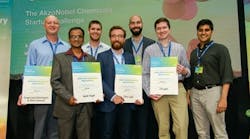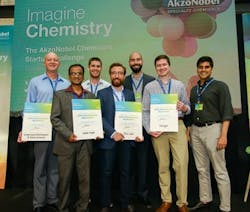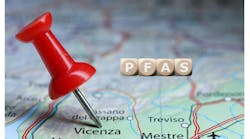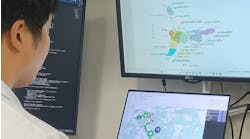Last year, AkzoNobel Specialty Chemicals, Amsterdam, launched an innovative contest for innovators. Its Imagine Chemistry Challenge sought entries from startups in technical areas of interest to the company, with winners getting support from AkzoNobel and its partners. Ten startups won in 2017 —see “Imagine Chemistry Challenge Names Winners.”
[pullquote]
“Imagine Chemistry is all about finding innovative solutions to real-life chemistry challenges. As a global leader in highly demanding chemistry, as well as safety and sustainability, we have experience and expertise few companies can match. However, we have realized that we don’t have all the answers,” explains Werner Fuhrmann, CEO of AkzoNobel Specialty Chemicals.
In this year’s follow-up challenge, categories were fine-tuned to more closely match the company’s specific needs: sustainable small-particle technologies; wastewater-free chemical sites; intelligent chemical plants; revolutionizing chlorate production; sustainable liquid-to-powder technologies; and zero-footprint-surfactant platforms. The contest also accepted ideas related to other areas.
Startups and researchers submitted a total of 150 entries by deadline date in mid-March. Twenty were selected for the finals, which took place in Gothenburg, Sweden, in late May/early June.
AkzoNobel awarded a joint development agreement to each of these companies: Green Lizard Technologies, Belfast, U.K.; Water Knight, Leeuwarden, The Netherlands; Fero Labs, New York City; and Solugen, Houston.
At the finals, key people involved in the innovations worked with more than 90 experts from AkzoNobel and partner organizations (KPMG, Icos Capital, Lux Research and Chalmers Ventures) to further develop their proposals and build business cases. Then, a jury drawn from AkzoNobel and its partners chose winners. “This was truly a crop of fantastic and promising entries… This made it truly a challenge to decide on the winners,” notes Peter Nieuwenhuizen, the chemical company’s chief technology officer.
The jury picked four overall winners:
• Fero Labs, New York City, for its machine-learning software that automatically builds models to predict quality issues, identify production bottlenecks and improve key process parameters;
• Green Lizard Technologies, Belfast, U.K., for its bio-based route to glycidol, a specialty epoxide that is suitable for the production of nonionic surfactants and other uses;
• Water Knight, Leeuwarden, The Netherlands, for its advanced oxidation reactor that uses cavitation to reduce chemical oxygen demand and increase biodegradability of wastewaters; and
• Solugen, Houston, for its process to make specialty grades of hydrogen peroxide by coupling enzymatic conversion of plant starch with glucose-to-sorbitol hydrogenation.
AkzoNobel awarded a joint development agreement to each.
In addition, six other entries received prizes.
AkzoNobel will support two entries:
• The University of Nottingham, Nottingham, U.K., for its process to produce porous microspheres from glass and other materials (via a research agreement); and
• Edinburgh Napier University, Edinburgh, U.K., for its method to make cellulose nanofibrils from seaweed (with time to test the technology at AkzoNobel’s research center).
AkzoNobel’s partners will provide support to other winners:
• Invert Robotics, Breda, The Netherlands, for its technology for robotic inspection of tanks and other equipment (KPMG);
• Semiotic Labs, Leiden, The Netherlands, for remote monitoring of motors and other rotating equipment (Icos Capital);
• Fraunhofer UMSICHT, Oberhausen, Germany, for its catalytic technology to elongate the carbon chain of renewable short-chain alcohols and ketones (Lux Research); and
• FineCell, Stockholm, Sweden, for its process to produce nanocellulose (Chalmers Ventures).
I was fortunate enough to attend the finals. The event clearly underscored to me the value of the challenge — for more details about it, go to https://www.imaginechemistry.com — and that other chemical companies also should take such an enlightened approach to cultivating relationships with startups.




